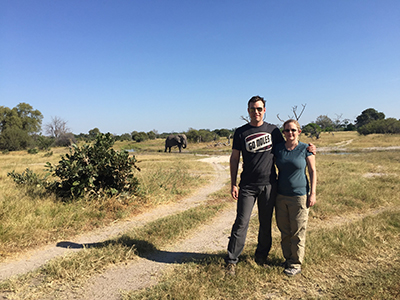|
Fall 2016
IN THIS ISSUE
d&G Lawyer News
Educational Workshops
Interested in a seminar on a recurring legal issue confronting your company?
Contact our event coordinator,
to learn more about our educational workshop options.
Visit Our Site:

101 E. Kennedy Blvd.,
Suite 2000
Tampa, FL 33602
813-229-2775
|

Q & A - Nick Porter
This quarter we are highlighting shareholder, Nick Porter. Nick has been with de la Parte & Gilbert since 2003,
and he usually spends his days focused on environmental and
administrative law issues. In May he took a well-deserved break and spent
two weeks in Africa with his wife, Mindi.

Q. Tell us where you traveled to and what a typical day was like.
A. We traveled to Botswana and Zimbabwe, more specifically, Moremi Game Preserve, Khwai Concession,
and Linyanti Wildlife reserve in Botswana, and Victoria Falls and Hwange National Park in Zimbabwe.
We'd wake up at sunrise, have coffee and breakfast, then the guide took us out on a game drive in the safari vehicle,
which is a converted Toyota Land Cruiser. The guides are incredibly knowledgeable and skilled at tracking down the
animals based on things like tracks in the sand, the sounds the other animals are making, the direction the wind is blowing,
movement of birds in the sky, smells, etc. In certain places, it seemed like we would come across a new group of animals
every few minutes (impala, giraffe, elephant, warthog, hippo, lions, hyenas, baboons, and so on).

Q. What was the rarest animal that you saw?
A. Probably the African wild dog. They are a threatened species and have been hunted to near extinction in many parts of Africa.
Q. What was one of the most exciting moments of your trip?
A. Probably seeing 4 adult lions and 6 or 7 lion cubs eating a huge cape buffalo that they had recently killed.
The sound is something that is hard to forget.
Q. The need for fresh, clean water is a constant struggle in the deserts of Africa.
How did the people you encountered obtain their water?

A. In the remote areas where we were, most of it was provided by wells. Interestingly, in Hwange National Park in Zimbabwe,
much of the wildlife is dependent on pans, or watering holes that fill with rainwater. Since rain is unreliable in the area,
diesel driven pumps are used to withdraw groundwater that is used to keep the pans filled year round, in order to maintain
a water supply for the animals. Apparently, they have been doing this since the 1930s, when the area was first
established as a game reserve, in what was then Rhodesia.
There is a fair amount of debate about whether it is appropriate to create this somewhat artificial habitat,
which has the effect of keeping more animals in the park and away from areas where they would come into conflict with humans,
but also keeps them from the natural migrations in search of water that they would do without human intervention.
The fact that this augmentation has been going on for nearly 100 years (originally they used windmills to pump the water into the pans)
show that the conflict between human intervention to maintain natural resources has been going on there for a longer time that you may have thought.
|





